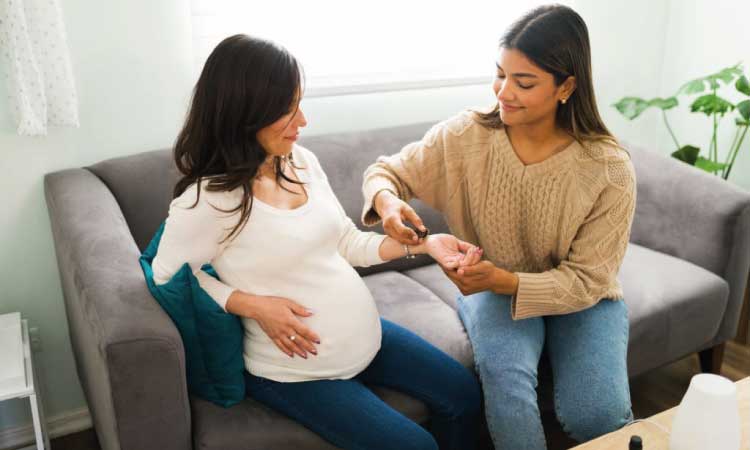Women develop a stronger sense of smell during pregnancy. If the unpleasant odor coming from their armpits causes discomfort for regular people, imagine how much more discomfort it causes for pregnant women. The safety of using perfumes during pregnancy is a question that many pregnant women are concerned about.
Almost all pregnant women prioritize the baby’s safety above all else throughout pregnancy. Pregnant women are often concerned that applying perfumes and deodorants during pregnancy would harm the baby’s development. “Can perfume cause miscarriage?” is one of the frequently asked questions by expectant women.
What Are Deodorants And Perfumes?
Both antiperspirants and deodorants ultimately work toward the same goal, which is to eliminate body odor. However, the mechanisms by which they operate are drastically different. To prevent odor-causing bacteria, a deodorant uses antimicrobial ingredients. It eliminates the odor of perspiration by targeting the bacteria that harbor in sweat.

Related Reading: Smell Sensitivity During Pregnancy (Hyperosmia)- Causes And Remedies
An antiperspirant works by clogging, shutting, or blocking sweat pores to create a barrier between sweat glands and the skin’s surface. Sweat cannot be released from the pores to the skin’s surface. While deodorants eliminate the source of body odor, antiperspirants prevent perspiration altogether.
Is It Safe To Use Deodorants And Perfumes During Pregnancy?
Perfumes and deodorants are widely considered safe to use while pregnant. Chemicals in cosmetics like deodorants and perfumes are thought to sit on the skin’s surface rather than seep in. Also, small tears in the skin of the mother may not let enough toxins enter the body to cause harm to an unborn baby or mother.
The market is flooded with deodorants and antiperspirants, but not all of them are safe during pregnancy. Even if there are no cuts, the skin can take in some strong chemicals. So it’s better to stick to natural perfumes rather than chemically-laden ones during pregnancy. Using a dual-purpose product (one that does the job of both deodorant and antiperspirant) is a risky business when you’re expecting a child because it can alter your skin’s pH level, leading to irritation.
How Much Perfume Or Deodorants Should You Use When Pregnant?

During pregnancy, it is always preferable to err on the side of caution. Aromatic products, especially scented lotions and creams, are discouraged during pregnancy because of their high chemical content. The same considerations should be taken into account when applying deodorant or perfume during pregnancy. You should cut back on your use of perfume, deodorant, and other scented personal care products while pregnant.
Don’t forget that trying out new chemicals is not a good idea while you’re expecting. Pregnancy is a vulnerable time. Avoid potential problems like an allergic reaction by sticking with the brand you know and trust rather than trying something new. It is recommended that pregnant women cut back on the amount of deodorant and perfume they use each day.
Related Reading: Eating Pickles During Pregnancy- All You Need To Know
When it comes to deo, natural essential oils, such as diluted citrus oil and plant extracts, are always better choices than commercial versions, during pregnancy.
Are There Any Risks Of Using Perfumes And Deodorants During Pregnancy?
Many women are allergic to deodorant during pregnancy and fragrance chemicals can cause nausea, headaches, and irritation to the eyes, nose, and throat. Inhaling perfume during pregnancy should be avoided as it can bring about respiratory issues1.
Asthma attacks and sinusitis are found to be exacerbated since many fragrance components are irritants and sensitizers to the respiratory system.
Many perfumes and deodorants include aluminium. This metal not only clogs skin pores, but it may also affect the neurological system and has been connected to a number of major health issues, including cancer2.
Recent studies have looked at the possibility that exposure to hazardous metals, particularly Aluminium, might result in miscarriages3. The use of aluminium deodorant during pregnancy also increases the risk of preterm labor4.
There is more to perfume and deodorant during pregnancy than aluminium! Watch out for their toxic counterparts as well. When purchasing deodorants and fragrances during pregnancy, watch for the following potentially harmful components in the ingredient list:
- Parabens (Methylparaben and Propylparaben): Several studies have pointed to a connection between the use of parabens in products during pregnancy and certain birth outcomes. Birth weights of infants born to mothers who were exposed to high levels of parabens during pregnancy may be higher than those of infants born to mothers who were not or rarely exposed to parabens5
- Phthalates (MEP, MBP, MEHP, MEHHP, MECPP) : Researchers found that preterm birth rates were higher among women who were exposed to multiple phthalates while pregnant6. In addition, it may have a future impact on the cognitive performance of the unborn child. Prenatal exposure to phthalates has been linked to lower IQ in children. Although both sexes may be at risk, the statistical link is stronger in male children7
- Triclosan: Triclosan may reduce the levels of thyroid hormones that are important for fetal growth and development8. Infants’ birth weight, length, head circumference, and gestational age can be inversely correlated with their mother’s exposure to triclosan9
- Propylene Glycol: It is recommended that infants and pregnant women avoid getting exposed to propylene glycol because it is more difficult for their bodies to break it down. Propylene glycol exposure has been linked to an increased risk of cardiovascular problems and heart disease symptoms10
Guidelines To Buy Roll-On Deodorant During Pregnancy
Pregnant women seeking deodorant products should carefully research product components to assess and choose the best product. You can find pregnancy-safe deodorants in the market.
Here are some elements to consider while selecting deodorant rollers for pregnant women:
- Choose items that have natural components
- Even though natural, stay away from deodorants that contain sage essential oils, camphor, aniseed, pennyroyal, and wintergreen while pregnant
- Choose items that do not include aluminum, a carcinogenic element
- Choose products that do not include substances that might cause irritation and are harmful to pregnant women and fetuses. This includes parabens, phthalates, triclosan, preservatives, and synthetic flavors
- Choose a natural roll-on deodorant with a nice, fresh aroma, such as lemon, mint, or cinnamon. These smells not only serve to efficiently reduce underarm odor, but also provide pregnant women with a sense of relaxation and comfort
- Opt for fragrance-free deodorants and perfumes because many of them contain phthalates, which disrupt hormone function
Some Safe Fragrances To Use During Pregnancy

Picking a reputable brand of perfume or deodorant that contains safe ingredients is especially important during pregnancy. Keep in mind that even natural perfumes can be problematic. However, there are perfumes allowed during pregnancy.
Pick brands that contain these components:
- Essential Oils
- Vegetable Starches
- Activated Charcoal
- Probiotics
- Baking Soda
- Zinc
- Magnesium
- Plant Oils
Natural perfumes are a healthy alternative to synthetic perfumes and deodorants. Natural perfume is safe for pregnancy.
While natural perfumes and deodorants might not be as effective as their synthetic counterparts, they are a much safer option. Natural fragrances are available in a variety of forms. It comes in a variety of convenient packaging options, including roll-ons and sticks, and, jars and sprays.
Some of the ingredients found in the best natural fragrance for pregnant women include:
- Sandalwood
- Coconut-Lime
- Cucumber Melon
- Citrus oil
- Spearmint
- Raspberry
- Cranberry
- Cherry
- Green Tea
- Cinnamon
- Rose
- Lemon mint leaf
- Hibiscus
- Peach
- Lilac
When should you consult the doctor?

The use of deodorants containing chemical compounds, such as aluminum deodorant during pregnancy can cause complications requiring medical attention. If you experience any of the following symptoms after applying perfume or deodorant, you may want to see a doctor.
- Allergic reactions of any kind
- Choking
- A headache
- Skin Rashes
- Difficulty in breathing
Controlling body odor is certainly part of maintaining personal hygiene. Picking a reputable brand of perfume or deodorant that contains safe ingredients is especially important during pregnancy. Also, instead of using strong fragrances, you can use something with a more subtle aroma. It’s important to keep in mind that even natural perfumes can trigger reactions.
Avoiding the use of deodorants and antiperspirants is the safest course of action for expectant mothers. Using natural products is the best alternative! Washing underarms with baking soda and applying neem paste, turmeric paste, sandalwood paste, and essential oils like lavender, etc. to sweaty areas can significantly reduce body odor. Pregnant women can benefit from a revitalizing bath experience by adding a few drops of essential oil, rose water, etc. to the water.
